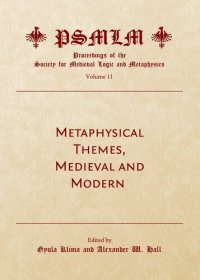
Ebook: Metaphysical Themes, Medieval and Modern: Proceedings of the Society for Medieval Logic and Metaphysics (The Immateriality of the Human Mind, the Semantics of Analogy and the Conceivability of God)
Author: Alexander W. Hall (editor)
- Year: 2014
- Publisher: Cambridge Scholars Publishing
- Language: English
- pdf
Metaphysical Themes, Medieval and Modern presents three sets of essays that engage the metaphysics of substance through a study of thought on this theme over the last eight centuries, shedding light on contemporary disputes as well as the history of thought leading into the modern era. Part I grows out of an author-meets-critics panel on Robert Pasnau's Metaphysical Themes: 1274-1671 (OUP, 2011). Pasnau's rich study delves into the four centuries wherein later medieval thought gives way to the modern period. Andrew Arlig reflects on Pasnau's discussion of holenmers, entities such as God and the human soul, that are thought to exist as wholes in more or less disparate things. Paul Symington, on the other hand, treats the substance ontology of Thomas Aquinas in particular through a reflection on Aquinas' understanding of the ontological status of the various modes or accidents of Aristotelian substances. Part II, "Substance Ontology, Medieval and Modern", transitions to contemporary substance ontology. Travis Dumsday canvasses the field of debate over what is the substratum of change, contending that the Aristotelian, hylomorphic account of substance that views substances as matter-form composites remains the most robust. Gyula Klima, while agreeing with Dumsday's conclusion, strengthens his argument with reference to the development of this bundle of problems within the recent history of analytic philosophy. Dumsday concludes with reflections on the relevance of substance ontology to natural theology, which, in turn, is the theme of Part III, "The Natural Theology of Thomas Aquinas", wherein Alexander Hall and Michael Sirilla consider how Aquinas' understanding of the divine substance bears on the logic of demonstration in his natural theology, concluding that contemporary Radical Orthodoxy readings that have Aquinas forfeit demonstrative proof that God exists misconstrue him on this point.
Download the book Metaphysical Themes, Medieval and Modern: Proceedings of the Society for Medieval Logic and Metaphysics (The Immateriality of the Human Mind, the Semantics of Analogy and the Conceivability of God) for free or read online
Continue reading on any device:

Last viewed books
Related books
{related-news}
Comments (0)